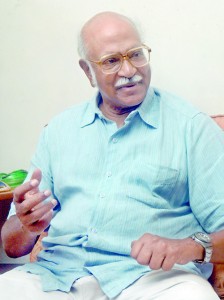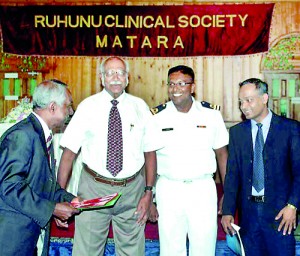Sunday Times 2
Guidelines to treat Divers’ Bends
Doctors will not be working in the dark when treating Decompression Sickness (DCS), as they can now be steered by the comprehensive guidelines for the management of this illness which affects divers.
The ‘Guidelines for the Management of DCS’ jointly produced by the Sri Lanka Medical Association (SLMA) and the Navy Directorate of Health Services were launched in November last year (2013) in Matara, the Sunday Times learns.

Dr. Malik Fernando. Pic by Nilan Maligaspe
Conceived by an SLMA past president, Dr. Malik Fernando, who is also a past president and past diving officer of the Sri Lanka Sub-Aqua Club, the Guidelines saw the light of day at a joint meeting of the SLMA and the Ruhuna Clinical Society.
Along with the guidelines came ‘First Aid for Underwater Divers with Bends’, once again a collaborative publication of the SLMA and the Navy’s Directorate of Health Services. Easy to understand, the First Aid document which is for the use of scuba-divers, boatmen and any others including life-savers who may be called upon to care for a diver with DCS also has a crucial ‘Help Hotline’. (See box please)
“My interest in DCS or ‘Bends’ began when I came in contact with ornamental fish collectors who had succumbed to this condition and faced many difficulties in obtaining treatment,” says Dr. Fernando. In fact, his SLMA Presidential address in 1992 as well as his Wijerama Endowment Lecture of 2008 titled ‘Of divers and diving’ had dealt with this subject.
Setting the backdrop, in the wake of the Sunday Times article headlined ‘Lanka as diving medicine hub’ of February 23, Dr. Fernando pointed out that he and three others had also put out leaflets titled ‘The Bends’ – A Guide to Divers as far back as May 1998.
The leaflets which are available in English, Sinhala and Tamil have been compiled by Dr. Fernando, former NARA diver and marine biologist Arjan Rajasuriya, former naval officer Lt. Cdr. C.H. Liyanage and an officer of the Colombo District Marine Fish Collectors’ Cooperative Society Ltd., Darrel Fryer. They give in-depth information about the dangers of ‘Bends’, how it can be prevented, what symptoms to look out for and if there is no other option but to do ‘in-water recompression’ what the schedule should be, while urging divers to seek treatment at a hospital.
Pointing out that DCS is known by all divers as ‘Bends’ because the pain it causes makes people bend in double, Dr. Fernando explains that the medical profession in Sri Lanka has been aware of this condition since 1986.

SLMA’s 2013 President Dr. B.J.C. Perera receives the Guidelines from Dr. Malik Fernando in November last year, while Surgeon Lieutenant Dr. Buddhika Lokugamhewa who represented the Navy’s Director-General of Health Services and Consultant Neurologist Dr. P.J.P. Peiris look on.
Two cases of bends in ornamental fish collectors were reported in the Ceylon Medical Journal by Prof. Janaka de Silva, Dr. Dennis Aloysius, Dr. J.B. Pieris and Dr. Sita Nanayakkara, he says, adding that since that time at least, ornamental fish collectors have been falling victim to this condition and many have been treated at the Navy Unit in Trincomalee.
According to Dr. Fernando there was a time, before Navy doctors were trained in Diving Medicine (there are a number of them now), when the diving officers in charge of the Diving and Salvage Unit of the Navy that houses the Recompression Chamber administered treatment themselves. “I helped them when they were faced with difficult decisions. Now the process is streamlined with the Navy doctors in the hospital and the chamber operators working together to treat victims.”
Stressing that the Navy establishment at Trincomalee is the only unit in Sri Lanka where definitive treatment for ‘Bends’ can be administered, he urges that it is imperative for victims to be transferred there as soon as possible.
Due to ignorance regarding this condition by many doctors, the transfer is often delayed when victims enter government hospitals. It is also to correct this situation and make them aware that the guidelines have been launched, Dr. Fernando added.
Hotline
If anyone needs advice on ‘Bends’ or is seeking answers to questions, they may call Dr. Malik Fernando on 0777678606; Dr. E.W. Jayasingha on 0777849284 or Mr. Darrel Fryer on 0777482683


